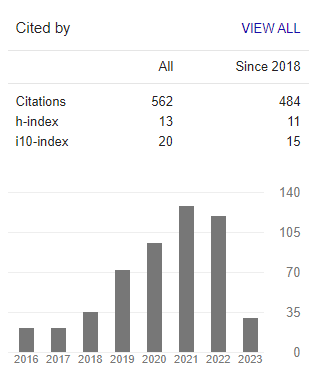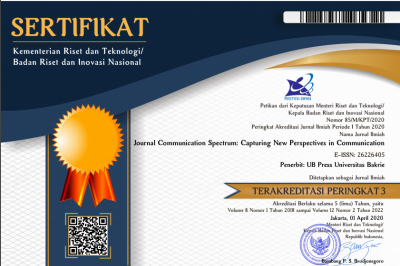THE INFLUENCE OF E-CONSUMERS' MOTIVATION TOWARD ATTITUDE AND SATISFACTION: The Uses and Gratifications Approach
Abstract
This study examines the influences of entertainment, informativeness, and Web irritation on attitude toward online shopping and satisfaction in online shopping. Particularly, satisfaction in online shopping is explored as the consequences of attitude toward online shopping, while informativeness, entertainment, and irritation are the antecedents of attitude toward online shopping. Data were collected through a quantitative study applying an online questionnaire carried out in 2020, using a representative sample. Findings showed that attitude toward online shopping is determined by entertainment, while informativeness does not significantly affect consumers’ attitude toward online shopping. Web irritation was also found to be of equal importance in influencing the formation of consumers’ attitudes toward online shopping but in a negative manner. This suggests that Web irritation on online shopping sites has a significant influence on consumers. If online shopping sites are irritating, then consumers form negative attitudes toward online shopping. This study also found that consumers’ satisfaction to shop online is determined by their attitude toward online shopping. The findings contribute to the evolution of the Uses and Gratification Theory, particularly in online shopping in developing countries like Indonesia. This study provides implications to e-business, marketers, and website system developers of online shopping sites dealing with products.
To cite this article (7th APA style):
Hermawan, H. (2021). The influence of e-consumers’ motivation toward attitude and satisfaction: the Uses and Gratifications approach. Journal Communication Spectrum: Capturing New Perspectives in Communication, 11(1), 52-63. http://dx.doi.org/10.36782/jcs.v1i1.2133
Keywords
References
Chen, Q., & Wells, W. D. (1999). Attitude toward the site. Journal of Advertising Research, 39(5), 27-37.
Cho, Y., & Ha, J. (2011). Users' attitudes toward movie-related websites and e-satisfaction. Journal of Business & Economics Research (JBER), 2(3), 13-28. https://doi.org/10.19030/jber.v2i3.2861
Flanagin, A. J. (2005). IM online: Instant messaging use among college students. Communication Research Reports, 22(3), 175-187. https://doi.org/10.1080/00036810500206966
Hasan, B. (2015). Applying uses and gratifications theory to acceptance of ERP systems. In L. Zheng & M. Plaisent (Eds.), Int'l Conference on Business, Marketing & Information System Management (BMISM'15) (pp. 36-41). ICEHM. https://doi.org/10.15242/ICEHM.ED111
Internet World Stats (2019, December 31). Top 20 countries with the highest number of internet users. Internet World Stats. https://internetworldstats.com/top20.htm
Kania, D. & Agatha, N. (2011). Online Consumers and the Application of Uses and Gratification Theory, Case Study: The Kaskus Website. Journal Communication Spectrum: Capturing New Perspectives in Communication, 1(2), 91-108. http://journal.bakrie.ac.id/index.php/Journal_Communication_spectrum/article/view/6
Katz, E., Blumler, J. G., & Gurevitch, M. (1974). Utilization of mass communication by the individual. In J. G. Blumler & E. Katz (Eds.), The uses of mass communications: Current perspectives on gratifications research (pp. 19-31). SAGE Publications.
Katz, E., Haas, H., & Gurevitch, M. (1973). On the use of the mass media for important things. American Sociological Review, 38(2), 164-181. https://doi.org/10.2307/2094393
Khodabandelou, R., Karimi, L., Ehsani, M., & Ahmad, M. (2014). Applying the uses and gratifications theory to compare higher education students’ motivation for using social networking sites: Experiences from Iran, Malaysia, United Kingdom, and South Africa. Contemporary Educational Technology, 5(1), 53-72. https://doi.org/10.30935/cedtech/6115
Kim, J. (2004). Understanding consumers’ online shopping and purchasing behaviors. Doctoral dissertation. Oklahoma State University. https://hdl.handle.net/11244/6700
Korgaonkar, P. K., & Wolin, L. D. (1999). Web use motivation measure. Journal of Advertising Research, 39(2), 53-68.
Kuo, L. (2014, April 2). Four reasons why Indonesia is the world’s most perplexing e-Commerce frontier. Quartz. https://qz.com/194656/four-reasons-why-indonesia-is-the-worlds-most-perplexing-e-commerce-frontier/
Larose, R., Mastro, D., & Eastin, M. S. (2001). Understanding internet usage: A social-cognitive approach to uses and gratifications. Social Science Computer Review, 19(4), 395-413. https://doi.org/10.1177/089443930101900401
Lim, W. M., & Ting, D. H. (2012). E-shopping: An analysis of the uses and gratifications theory. Modern Applied Science, 6(5), 48-63. https://doi.org/10.5539/mas.v6n5p48
Luo, X. (2013). Uses and gratifications theory and E-consumer behaviors: A structural equation modeling study. Journal of Interactive Advertising, 2(2), 34-41. https://doi.org/10.1080/15252019.2002.10722060
Mao, D. (2010). A study of consumer trust in internet shopping and the moderating effect of risk aversion in mainland China [Undergraduate honors thesis, Hong Kong Baptist University]. HKBU Digital Library. https://libproject.hkbu.edu.hk/trsimage/hp/07050526.pdf
McCauley, B., Gumbley, S., Merola, G., McDonald, M., & Do, T. (2016). Facebook in Vietnam: Uses, gratifications & Narcissism. Open Journal of Social Sciences, 04(11), 69-79. https://doi.org/10.4236/jss.2016.411006
Pensworth, L. (2020, March 7). 2019 Internet Statistics, Trends & Data. DailyWireless. https://dailywireless.org/internet/usage-statistics/#Internet_Usage_Worldwide
Siekpe, J. S., & Kamssu, A. A. (2005). The Effect of Culture on Uses and Gratifications in Online Shopping. In Proceedings of the 36th Southwest Decision Sciences Institute Annual Conference (pp. 370-378). SWDSI. http://swdsi.org/swdsi05/Proceedings05/
Wang, T. (2014). The usage behaviors, motivations and gratifications of using user-generated media: The case study of Taiwan’s YouTube. Advances in Journalism and Communication, 2(4), 137-150. https://doi.org/10.4236/ajc.2014.24015
Zheng, F. (2006). Internet shopping and its impact on consumer behavior. Undergraduate Thesis [Unpublished]. The University of Nottingham. http://eprints.nottingham.ac.uk/20704/
Refbacks
- There are currently no refbacks.

This work is licensed under a Creative Commons Attribution 3.0 License.
Indexed by:
Archived in:
Listed in:
INTERNATIONAL ASSOCIATION FOR MEDIA AND COMMUNICATION RESEARCH


















